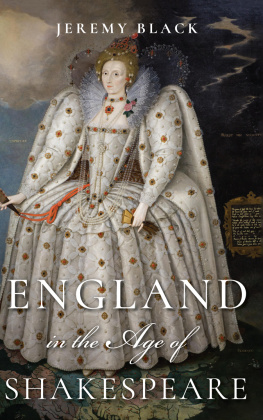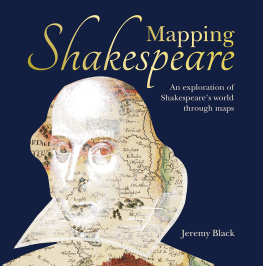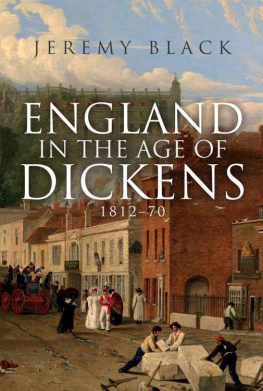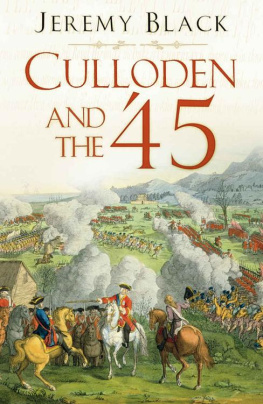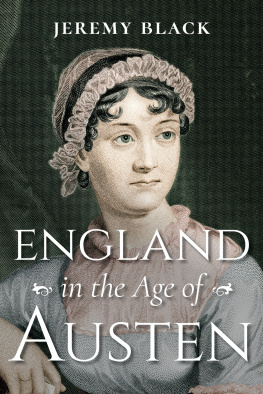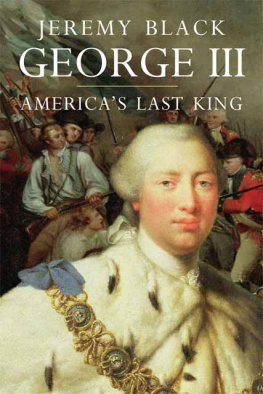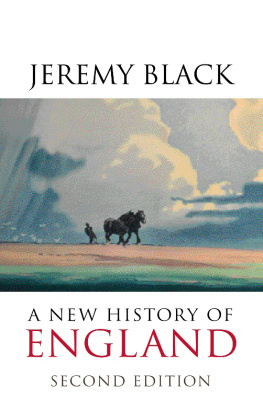Black Jeremy - England in the Age of Shakespeare
Here you can read online Black Jeremy - England in the Age of Shakespeare full text of the book (entire story) in english for free. Download pdf and epub, get meaning, cover and reviews about this ebook. year: 2019, publisher: Indiana University Press, genre: Religion. Description of the work, (preface) as well as reviews are available. Best literature library LitArk.com created for fans of good reading and offers a wide selection of genres:
Romance novel
Science fiction
Adventure
Detective
Science
History
Home and family
Prose
Art
Politics
Computer
Non-fiction
Religion
Business
Children
Humor
Choose a favorite category and find really read worthwhile books. Enjoy immersion in the world of imagination, feel the emotions of the characters or learn something new for yourself, make an fascinating discovery.
- Book:England in the Age of Shakespeare
- Author:
- Publisher:Indiana University Press
- Genre:
- Year:2019
- Rating:3 / 5
- Favourites:Add to favourites
- Your mark:
- 60
- 1
- 2
- 3
- 4
- 5
England in the Age of Shakespeare: summary, description and annotation
We offer to read an annotation, description, summary or preface (depends on what the author of the book "England in the Age of Shakespeare" wrote himself). If you haven't found the necessary information about the book — write in the comments, we will try to find it.
England in the Age of Shakespeare — read online for free the complete book (whole text) full work
Below is the text of the book, divided by pages. System saving the place of the last page read, allows you to conveniently read the book "England in the Age of Shakespeare" online for free, without having to search again every time where you left off. Put a bookmark, and you can go to the page where you finished reading at any time.
Font size:
Interval:
Bookmark:
JEREMY BLACK is Professor of History at the University of Exeter. He is author of many books, including Charting the Past: The Historical Worlds of Eighteenth-Century England, London: A History, and Mapping Shakespeare: An Exploration of Shakespeares World through Maps.

UNCERTAINTY HELD AT BAY: THAT was the experience of life and the molder of personality in early-modern England, the England of the sixteenth and seventeenth centuries. Man in the state of nature was described by Thomas Hobbes in Leviathan (1651), his masterpiece (of political thought and much else), as solitary, poor, nasty, brutish and short, and this phrase describes much of Shakespeares world. The sudden pitfalls of life, notably the fatal accidents and the tragic illnesses that snuffed out life with brutal rapidity, could be explained not only by the harsh injustices of chance but also by the impact of evil and malevolence.
These elements were repeatedly seen in Shakespeares plays; indeed, they gave the plays much of their plot, their dynamic energy, and their atmosphere. Characters could be defined in terms of how they responded to chance, evil, and malevolence. In turn, evil and malevolence worked in part, notably in the tragedies, by exploiting character, as with Iagos cloyingly seductive manipulation of Othello and the witches provocation of Macbeth and his wife, a provocation that is a seduction of another type.
All around them, contemporaries saw a battle between good and evil, a battle that was the cause of dread and fearwith jokes about it, as with the Porters speech in Macbeth, very much being gallows humor. Evil and malevolence, whatever their source and purpose, operated in and through the varied settings of life. The dark, both literally and metaphorically, was particularly important, as with the villainy in Much Ado About Nothing. This is a villainy dependent upon the misidentification that the dark makes far easier. The modern world can overcome darkness, with electric lighting and with global navigation systems. By contrast, in Shakespeares world, the dark was a pervading, spreading sphere; although, in the open-air theater in this period, when darkness falls in a play, the staging brings on more lights.
Darkness might not always be a token of menace, danger, and uncertainty. It could be a setting for romance and witty confusion. Moreover, in A Midsummer Nights Dream, which is set in and outside Athens, Oberon orders Puck to prevent Demetrius and Lysander from fighting:
overcast the night;
The starry welkin cover thou anon
With drooping fog as black as Acheron;
And lead these testy rivals so astray,
As one come not within anothers way. (III, ii)
The play demonstrates the vulnerability of humans to supernatural agencies, albeit to comic effect, as with Bottom being given the head of an ass (donkey). The humorous confusion of nighttime comic mischance is also seen in other plays, as in the highway robbery in Henry IV, Part I in which the Chamberlain tells Gadshill: you are more beholding to the night than to fern-seed for your walking invisible (II, i). The seed of the fern was believed to convey invisibility. However, alongside the romance of the evening in A Midsummer Nights Dream and humorous confusion elsewhere in Shakespeares work there is nighttime horror, terror, and evil. In contrast, pastoral plays very much employ daytime settings.
Nighttime fear especially befell travelers, both literal and figurative, whether simply unable to see their route or to grasp the menaces that might face them. In King Lear, the Fool sees the dark as part of the moral blindness that has overcome Lear and his kingdom and become the dominant tone of the latter: out went the candle, and he observes, we were left darkling (I, iv). Lear, in turn, is reborn through his experience into a degree of clarity, but he cannot regain what he has lost.
More generally, the dark was a world outside human understanding, not to mention outside human control. Like All Hallows Eve (Halloween, October 31), when the dead walked on the earth, the dead king walks at night in Hamlet, but he fades away at daybreak, aware that his realm is that of nighttime: not just nighttime imaginings but also nighttime reality. The ghost of this king is a part of a wider struggle, between Christian good and spirits, that is outlined in the first scene of the play. Aware of this struggle, Hamlet is concerned about the danger of being misled. Marcellus sets the ghosts response at daybreak in terms of a wider struggle between good and evil, observing:
It faded on the crowing of the cock.
Some say that ever gainst that season comes
Wherein our Saviours birth is celebrated,
The bird of dawning singeth all night long:
and then, they say, no spirit can walk abroad;
The nights are wholesome; then no planets strike,
No fairy takes, nor witch hath power to charm,
So hallowd and so gracious is the time. (I, i)
Lady Macbeth calls on the assistance of darkness, crying:
Come, thick Night,
And pall thee in the dunnest smoke of Hell,
That my keen knife sees not the wound it makes,
Nor Heaven peep through the blanket of the dark,
To cry, Hold, hold! (I, v)
Macbeths evil and increased lack of self-control, each a product of diabolical forces working on his narcissism, is measured by his willingness to call on the dark to cover the murder of his erstwhile friend, now imagined rival, Banquo, when he declares:
Come, seeling Night,
Scarf up the tender eye of pitiful Day,
And, with thy bloody and invisible hand,
Cancel, and tear to pieces, that great bond
Which keeps me pale!Light thickens; and the crow
Makes wing to th rooky wood;
Good things of Day begin to droop and drowse,
While Nights black agents to their prey do rouse. (III, ii)
This was a world of nightmare; and the role of the dark in the life of the imagination was both aspect and product of a more generalized sense of fear, one that was in no way restricted to the dark, although focused there. The witches brought onstage in Macbeth operate in the dark or in misty vapors. Caliban, the born devil of The Tempest, is a thing of darkness (IV, i; V, i). In this play, the (dead) witch Sycorax is a malign as well as mysterious counterpoint to Prosperos white magic, a witch passing on her poison through her son, Caliban. His plans may be thwarted, but they are vicious and dangerous and provide much of the drama of the play.
The approach of playing Caliban as the victim of Western colonialism and of treating Prospero and Miranda as having selfish reasons to stigmatize him unfairly, and thus as unreasonable in their criticism, represents a different power relationship. This relationship also captures the idea of a monstrous other, although, in this case, one in which sympathy is directed to the supposed monster. Moreover, Calibans otherness has frequently been represented by his color. This contrast with the account of Calibans diabolical origins involves a very different reading of the play; however, it is one that makes more sense to some modern audiences.
In their malevolence and deceit, the devil and the witches were real for contemporaries, including playgoers, representing a directing and leading part of the potent and varied legions of evil. In Alls Well That Ends Well, the Clown refers to serving a great prince: The black prince, sir, alias the prince of darkness, alias the devil... he is the prince of the world (IV, v). Satan, limbo, and furies return as subjects of talk in that play (V, iii). In The Comedy of Errors, the courtesan is decried, inaccurately, as the devils dam... she comes in the habit of a light wench (IV, iii). In
Next pageFont size:
Interval:
Bookmark:
Similar books «England in the Age of Shakespeare»
Look at similar books to England in the Age of Shakespeare. We have selected literature similar in name and meaning in the hope of providing readers with more options to find new, interesting, not yet read works.
Discussion, reviews of the book England in the Age of Shakespeare and just readers' own opinions. Leave your comments, write what you think about the work, its meaning or the main characters. Specify what exactly you liked and what you didn't like, and why you think so.

